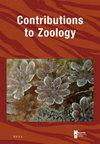Insect evolution toward aquatic habitats; reassessment of antennal sensilla in the water bug families Ochteridae, Gelastocoridae and Aphelocheiridae (Hemiptera: Heteroptera: Nepomorpha)
IF 2.2
2区 生物学
Q1 ZOOLOGY
引用次数: 7
Abstract
The first comparative morphology study on antennal sensilla of Ochteridae, Gelastocoridae and Aphelocheiridae, carried out with the use of a scanning electron microscope, is provided. Our research hypothesis was: the antennal sensilla of the studied families reflect their different adaptations for use in aquatic habitats, while maintaining a common set of sensilla similar to other water bugs (Nepomorpha). Therefore, the number and placement of antennal sensilla of several species in the mentioned families were studied using scanning electron microscopy. Nine main types of mechano- chemo- and thermo-hygroreceptive sensilla were confirmed on their surface, including sensilla trichodea, chaetica, club-like, campaniformia, basiconica, coeloconica, plate-like, ampullacea and sensilla placodea multilobated. While seven of these were already documented in other species, two of them (sensilla plate-like and placodea multilobated) were yet to be documented on the antennae of Nepomorpha. All families display differences in the shape and length of antennae as well as among sensilla types. These findings support our hypothesis regarding differences in sensillar structures among families adapted differently to suitable niches. Differences between these families and previously studied nepomorphan taxa (Nepoidea) were also documented. However, the general set of sensilla observed on the antennae of the studied species is very similar to the one documented in Nepoidea. Therefore, we confirmed our assumptions regarding similarities in antennal sensilla between the studied families and other nepomorphan insects.昆虫向水生生境的进化;水蝽科、水蝽科和水蝽科触角感受器的再鉴定(半翅目:异翅目:小翅目:小翅目)
本文首次利用扫描电子显微镜对狐猴科、Gelastocoridae和Aphelocheiridae的触角感受器进行了形态学比较研究。我们的研究假设是:所研究科的触角感受器反映了它们对水生栖息地的不同适应,同时保持了一组类似于其他水虫(Nepomorpha)的共同感受器。因此,利用扫描电子显微镜对上述科中若干种的触角感受器的数量和位置进行了研究。在其表面确定了9种主要的机械化学感受器和热湿感受器类型,包括毛状感受器、毛状感受器、棒状感受器、钟形感受器、基形感受器、腔形感受器、板状感受器、壶状感受器和多叶形感受器。虽然在其他物种中已经记录了其中的7个,但其中2个(板状感受器和多瓣瓣感受器)还没有在Nepomorpha的触角上记录下来。所有科在触角的形状和长度以及感受器类型上都表现出差异。这些发现支持了我们的假设,即在适应不同生态位的家庭中,感受器结构存在差异。这些科与以前研究过的nepoorphan分类群(Nepoidea)之间的差异也被记录下来。然而,在研究物种的触角上观察到的一般感觉器与在Nepoidea中记录的非常相似。因此,我们证实了我们关于所研究的科与其他麻蝇昆虫之间触角感受器相似性的假设。
本文章由计算机程序翻译,如有差异,请以英文原文为准。
求助全文
约1分钟内获得全文
求助全文
来源期刊

Contributions to Zoology
生物-动物学
CiteScore
4.00
自引率
4.50%
发文量
16
审稿时长
>12 weeks
期刊介绍:
Contributions to Zoology solicits high-quality papers in all systematics-related branches of comparative zoology (including paleozoology). Preference will be given to manuscripts dealing with conceptual issues and to integrative papers (e.g., ecology and biodiversity, morphology and phylogeny and character state evolution, phylogeny and historical biogeography, systematics and bioinformatics, bioinformatics and biodiversity, habitat disturbance and biogeography, etc.). Reviews and alpha-taxonomic contributions are considered for publication, but acceptance will depend on their high quality and exceptional nature.
 求助内容:
求助内容: 应助结果提醒方式:
应助结果提醒方式:


